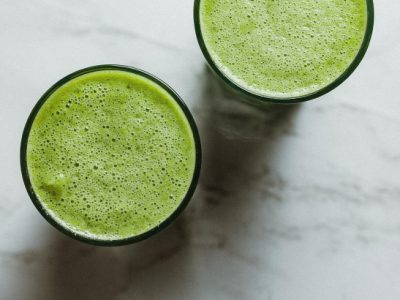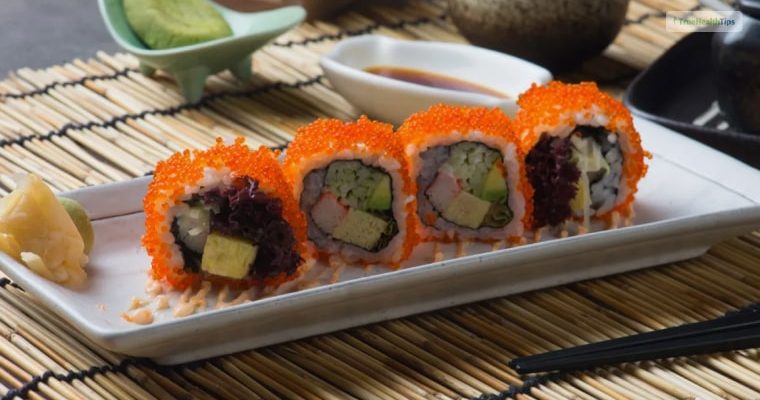
You must have heard of Masago sushi and must have wondered about what is Masago in sushi and what its benefits are. Masago is basically the ripened egg of capelin fish. Hence, it is also commonly known as capelin roe. Capelin fish is mostly found in the cold water regions of the world since it is a foraging fish. Hence, it is mostly found in the Arctic region, as well as the North Atlantic and North Pacific regions.
Capelin fishes are one of the most important sources of food for various aquatic animals and oceanic animals, which include whales, Atlantic cod, puffins, etc. However, Capelin fishes only consume plankton. In some cases, these fishes eat crustaceans after coming across them. In this article, we will mainly talk about the health benefits of these fish.
What Is Masago?
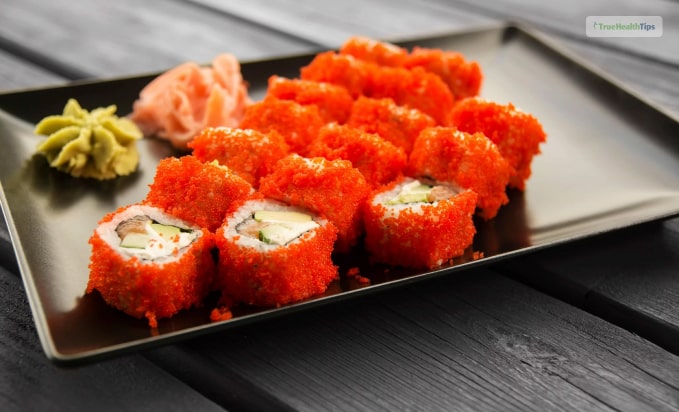
East Asia is one of the major consumers of the eggs of Capelin, also known as Masago. In many cases, Masago is also used in sushi dishes in Japan and other East-Asian countries. In certain types of sushi dishes, Masago is one of the most important ingredients and acts as a healthy and beneficial component, which is nothing short of a superfood.
Being a popular ingredient, Masago is used in a variety of dishes other than sushi for its distinct taste and specialty. These eggs of Capelin fish are also called Smelt Roe, as they belong to the Smelt family. Masago comes from female Capelin that release eggs while they are around 2 to 4 years of age. They continue to spawn until they die.
The color of Masago is pale yellow and is commonly used in garnishing sushi rolls. To make them more visually appealing, Masagos are dyed in bright-hued colors like red, green, and orange. Due to its mild flavor and beneficial effects, Masago is sometimes mixed with various ingredients like squid ink, wasabi, or ginger.
Tobiko Vs. Masago: What Is the Difference?
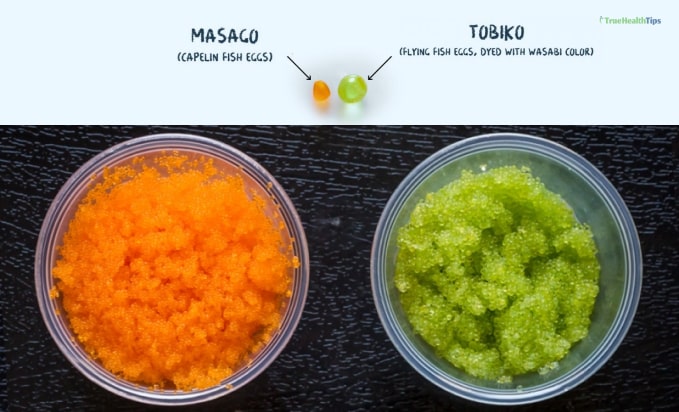
In many places, people confuse Masago with Tobiko. The roe or eggs of flying fish are known as Tobiko. Although these are very similar to that of Masago, they still have inherent differences when it comes to physical features and beneficial properties. Furthermore, these two are different in regard to their nutritional properties as well.
Masago is smaller in size and is less expensive as compared to Tobiko. Hence, in many places, you will see Masago being used as a substitute for Tobiko. On the other hand, Tobiko has a reddish hue, while Masago is yellow in color. Hence, in many cases, Masago is dyed before serving them as an ingredient in sushi rolls to enhance the visual interest.
In addition to that, Masago is less crunchy than Tobiko, but it is similar in taste. However, despite the similarity between Masago and Tobiko, Tobiko is still considered a high-end ingredient for sushi rolls due to it being of better quality and costly.
What Is The Nutritional Information Of Masago?
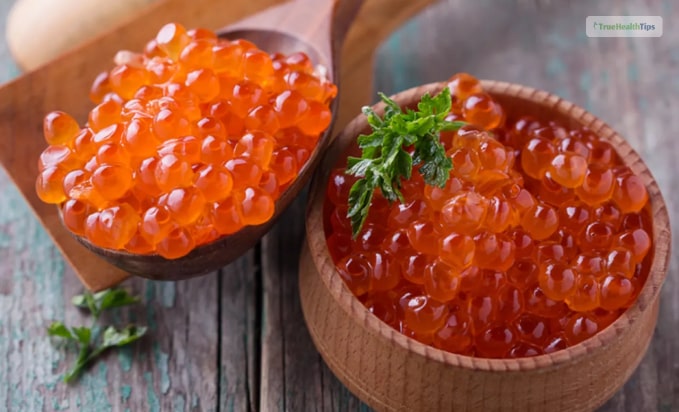
According to WebMD.com, “Masago is a rich source of vitamin B12, a nutrient needed by the body’s cells for metabolism. Deficiency in vitamin B12 can hurt the body’s ability to absorb nutrients, make new blood cells, and even lead to anemia.”
Most fish roes have high vitamin B12 content. Vitamin B12 is water soluble that only comes from foods or vitamin supplements. This vitamin is not produced by the body on its own. Hence, consuming Masago will help you in this regard. Apart from that, with every tablespoon of Masago serving, you will get 3 grams of protein and 20 calories.
What Are The Major Benefits Of Consuming Masago?

Although consuming Masago does not have any serious side effects, there are still a variety of benefits associated with Masago. Here are some of them which might interest you:
Better Heart Health
Due to the presence of Omega-3 fatty acids in Masago, it helps in preventing the inflammation of the artery walls in the heart. Omega-3 fatty acids reduce the possibility of heart disease.
Your Eyes Will Stay Healthy
Omega-3 fatty acids also play a lot in ensuring better health for the eyes. People consuming Masago will thus have better retina structure and eye health.
Better Bone Health
With a good presence of Vitamin D, Masago also helps a lot in ensuring better bone health in humans. Furthermore, many doctors recommend the consumption of vitamin D supplements for osteoporosis.
Controlled Arthritis Symptoms
Omega-3 fatty acids in Masago also help in reducing inflammation symptoms in the body. This, in turn, helps a lot in controlling the effects of people suffering from rheumatoid arthritis.
Weight Loss
Masago can also help in reducing weight in people. According to WebMD, “eating foods high in protein can reduce cravings for snacks and other unhealthy foods…people who got 25% of their calories from protein were able to lower their previous cravings.”
More Muscle Strength
Masago, being a food rich in protein content, helps in building new muscles and also helps in maintaining the already existing ones. If you have an active lifestyle, Masago can be a good addition to your diet.
Improved Cholesterol And Blood Pressure
Consuming Masago can be good for controlling high blood pressure and cholesterol as well. According to WebMD.com, “Researchers have found that high-protein diets, which include roe like masago, were able to reduce the body’s LDL cholesterol and triglyceride levels, which helped people better regulate their blood pressure.”
Avoid Masago If:
People with certain dietary restrictions or health conditions may need to exercise caution when consuming masago, which is a type of fish roe commonly used in sushi.
Fish roe, including masago, contains purines, which can contribute to elevated uric acid levels. Excess uric acid can lead to gout, a painful inflammatory arthritis.
- Firstly, individuals with seafood allergies should avoid masago, as it is derived from fish eggs and can trigger allergic reactions.
- It is essential for those with known or suspected allergies to thoroughly check ingredient lists and communicate their dietary restrictions when ordering dishes containing masago.
- Individuals with specific medical conditions, such as gout or high purine levels, may need to limit their intake of masago. Therefore, individuals with gout or those aiming to manage purine intake should be mindful of their masago consumption.
- Pregnant individuals are advised to avoid raw or undercooked seafood, and this caution extends to masago. Raw fish roe may pose a risk of contamination with harmful bacteria or parasites. Pregnant individuals should opt for fully cooked alternatives or consult with their healthcare provider before including masago in their diet.
- Overall, individuals with allergies, specific health conditions, or during pregnancy should carefully consider their dietary choices regarding masago to prioritize their well-being.
Summing Up
In this article, you learned about the major benefits associated with the consumption of Masago. As you can see from the benefits of Masago, it helps in maintaining bone health, heart health, and eye health, which are really important for the body. Furthermore, Masago also helps in reducing arthritis symptoms in old people and offers better muscle strength in addition to improved cholesterol levels and blood pressure.
However there are little to no disadvantages to consuming Masago, but if you are allergic to seafood, we recommend you stay away from Masago. How do you like the taste of Masago? Share your views in the comments section below.
Read Also About:

